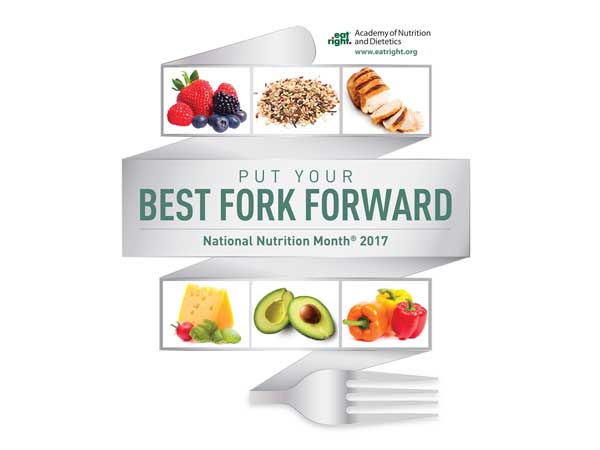This year, the Academy of Nutrition and Dietetics’ theme for National Nutrition Month is “Put Your Best Fork Forward.” This symbolizes how health can be achieved by making choices to have a healthy lifestyle, which includes smart food choices.
Registered dietitians have a passion for helping others make positive changes to their health. If you want help determining the best food choices based on your preferences, goals and medical conditions, a dietitian can help. If you know what to eat but just struggle staying on track or maintaining motivation, a dietitian is the perfect person to keep you focused.
Dietitians play an integral part in a Veteran’s care at VA. Dietitians who work in the inpatient (in the acute-care hospital or community living centers) setting assess nutrition and educational needs of Veterans during their hospital stay and also once discharged home. Each Veteran is provided individual care that can include diet education and counseling or food preferences for their trays. The dietitian plays a key role for those needing specialized nutrition through tube feeding, altered textured diets (such as those with swallowing issues) or unique needs for particular vitamins, minerals or other nutrients. Proper nutrition is critical for wound healing, preventing and resolving dehydration and malnutrition, among other conditions.
Outpatient dietitians provide individual or group diet education and counseling. Examples include Veterans receiving dialysis, learning to manage diabetes, high blood pressure or their weight with the MOVE! ® weight management program. Outpatient dietitians work with Veterans for continued support, guidance and goal-setting through face-to-face appointments or through video conference. Dietitians are trained in motivational interviewing and behavior-change counseling to guide Veterans to discover reasons they may want to make changes. At some facilities, outpatient dietitians use Healthy Teaching Kitchen Demonstrations to prepare a healthy recipe that Veterans get to taste.
Learn how to put your best fork forward into a Fiesta Black Bean Salad as demonstrated by a dietitian from the Portland VA.
VA dietitians may also work in Home Based Primary Care (HBPC). HBPC dietitians have an exciting opportunity to work with Veterans in the Veterans’ homes. These Veterans are unable to attend appointments at the VA so their healthcare team (including a dietitian) goes to them. They provide nutrition counseling and coordinate nutrition-related care in way similar to the inpatient and outpatient dietitians. At some VAs, home telehealth is another avenue for Veterans to come in contact with a dietitian. This is where the Veteran has medical equipment, such as a scale or blood pressure cuff, in their home and the information from those devises is sent electronically to the VA. The dietitian, as a member of the team, monitors nutrition problems and calls and checks periodically to see how things are going. The dietitian gives additional nutrition-related insight and coaching to meet goals.
Behind the scenes, dietitians fill other jobs that range from management, supervisory roles in the kitchen, and providing expertise on various committees such as Employee Wellness.
If you’ve never met with a dietitian but are interested in doing so, call your local VA to see how you can get a referral today! Here’s to a Healthy and Happy National Nutrition Month.

Topics in this story
More Stories
Bob Jesse Award celebrates the achievements of a VA employee and a team or department that exemplifies innovative practices within VA.
The Medical Foster Home program offers Veterans an alternative to nursing homes.
Watch the Under Secretary for Health and a panel of experts discuss VA Health Connect tele-emergency care.







I may ask to see a dietician on my next Dr. Visit coming up in a month or so.. gaining to0 much weight for my old body to carry..
I’ve had weight issues over the years and have seen quite a few dietitians while on active duty & after through the VA. I only had one that actually discussed the food I was eating and helped me choose the right foods from the foods I liked. I only seen for a little while before she retired. The last dietitian I seen was at the VAMC Salisbury. I went to her office and introduce myself and I told her I had an appointment. We’ll she jumps ups and start pulling various brochures off the shelves and then handed them to me. I asked her if there was anything else she said that was it. I left & dropped the brochures in the trash on the way out of the VAMC. In my experience this usually what happens when I get referred to a dietitian. I get a handed a bunch of brochures and nothing else!!